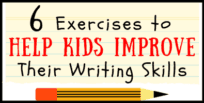For the love and joy of good writing, we offer you these resources—
Are you looking for easy-to-use advice on how to improve writing skills for your students? You are in luck! You see, below we share six simple ways to make writing more fun to teach and to learn. Plus, there’s a bonus list of 10 writing ideas to support your learners.

Take a look.
- Writing is Often a Giant "UGH" for Both Teachers and Their Learners
- Good Writing Skills = Greater School and Life Success
- Six Ways to Improve Writing Skills
- Borrowing Inspiration to Practice Writing Skills
- Writing Practice Is Key!
- Practice Writing & Improve Writing Skills with this List of 10 Prompts
- Ok… Back to that List of Ideas for Better Writing Skills
- Using the Lens of Their Senses for More Potent Writing Results
- Getting Feedback from Others
- A Few Closing Thoughts
- Improve Writing Skills Resources
Writing is Often a Giant “UGH” for Both Teachers and Their Learners
It’s true that many educators simply do not feel adequately equipped to teach the subject of writing to their kids. No doubt, this feeling of inadequacy adversely affects them and their students. Sadly, this is why writing skill mastery is lacking and below grade level for so many students.
But take heart, help is here for you and your writers!
Yes, you can use these teaching writing resources to help your kids achieve greater levels of success in school and in life. But, first, let’s briefly dig into some of the challenges of teaching writing.
It is an unfortunate fact that many students struggle when it comes to writing. Though most people understand the value of subjects like math and science, the full development of a student’s writing skills is often neglected.
Because a child’s writing skills — or lack thereof — will follow them throughout life, improving those skills is, indeed, both an important and a vital life skill.
Good Writing Skills = Greater School and Life Success
Of course, writing skills aren’t just important when it comes to book reports and standardized tests.
Refined writing skills can also make a huge difference when it’s time for students to start working on college essays and resumes as an adult.
With that in mind, we believe it’s important for educators and parents to take every opportunity they can to help students and kids become better writers.
To support you, check out our six best writing tips below to help you teach your learners how to improve their writing skills. We hope you’ll use these ideas in your writing lesson plans this school year.
Six Ways to Improve Writing Skills
Ok, sharpen those pencils. The time has come to explore some fun and fabulous writing assignments and prompts.
1. Read Anything and Everything
Great writing always starts with great reading. If you want to help your students become better writers, the first thing you should do is get them to start reading as much as possible.
Here are just a few of the ways reading helps students improve their writing skills:
- Exposes students to new vocabulary and nuances of language.
- Expands a student’s worldview and teaches him or her about the experiences of others.
- Offers inspiration and promotes imagination and creativity.
Best of all, the benefits are the same no matter what they read. So whether your students are into fiction or non-fiction, popular novels, biographies, or comic books, they can benefit from more frequent reading!
Borrowing Inspiration to Practice Writing Skills
2. “Great Artists Steal”
Have you ever heard the saying, “Good artists copy; great artists steal”? There’s some truth here that can truly help your students become better writers.
Now clearly, plagiarism is a terrible thing—and you’ll need to teach your students about the pitfalls of blatant artistic theft. However, deriving inspiration from a piece of writing and learning how to craft your own work in a similar manner is a completely different story. In part, it’s what truly sets great artists apart from good ones.
To use this principle in your classroom, ask your students to find a piece of writing they enjoy. Then, have them write something that is inspired by the original source material. (Hint: You may want to have them write outlines to help guide them.) They may want to write a sequel, remix the original, or take on a whole new topic but use the author’s style and tone to approach it.
The goal here is to take one element of the successful work and then “steal” it by using it as inspiration to make something of their own. Remember, the point here is writing practice, not creative idea generation.
Above all, encourage your writers to play with this idea and to have fun with it. Enjoyment is truly the best approach to helping anyone improve their ability to write.

Writing Practice Is Key!
3. Practice Truly Makes Perfect
Learning the English language is hard. That’s a fact. And, while “Practice makes perfect” may sound like just another cliché, it’s an adage that couldn’t be truer when it comes to writing.
Students will benefit from all types of writing. But one of our favorite ways to promote consistency is to have students practice with daily journal prompts.
There’s no better way to improve a student’s writing skills than to have him or her write more frequently.
Journal writing is particularly special because it gives students the opportunity to explore their own thoughts and ideas in a safe, controlled space. Doing so helps kids become more attuned to themselves while also helping to improve their communication skills through the act of everyday writing.
Plus, when journaling, a grammar mistake can be easily overlooked, and that’s the beauty of it. Indeed, keeping a writing journal is a simple yet powerful tool any language learner may use. By doing so they will, no doubt, further develop and refine their English writing skills.
The bottom line is the art of writing can take many forms. Yet, journal writing remains, hands-down, one of our favorites. (No surprise there, right?)
Practice Writing & Improve Writing Skills with this List of 10 Prompts
Use these journal prompts to help your students dive into journaling and improve their writing skills:
- Write a reflective essay about your earliest memory. Why do you think it has stuck in your head?
- Choose three key words that describe your parents. Then, explain why those words represent them and how they make you feel.
- What is the most interesting book you’ve ever read? Why did it catch your attention?
- Write about something in the world that baffles you.
- Describe your favorite feeling in the world. Use as much specificity as possible.

- Write about a time when you were surprised by something another person did. What happened? How did you react?
- If you could visit any place or time in the universe, where would you go? Why?
- What is the most difficult thing you’ve ever done? Describe your experience and how you feel when you think about it now.
- What would you do if you knew that you would live forever? How would your life be different?
- Write about an unusual belief or philosophy you have and explain why it makes sense to you.
Ok… Back to that List of Ideas for Better Writing Skills
4. Engage in Different Types of Writing
Once kids are accustomed to writing regularly, you can further hone their skills. You can do so by having them practice new types of writing. Indeed, there’s a whole world of creativity out there just waiting to be explored. From short stories to persuasive essays to personal reflections—and your students can benefit from all of it.
You see, some writing skills are transferrable across all genres. Things like vocabulary, sentence structure, and clarity are important no matter what you’re writing.
However, other writing skills are a little more nuanced and may only be discovered by trying something new.
For instance, a book report that is heavily based on fact and knowledge doesn’t lend itself to empathy and imagination in the same way that a character study or first-person short story does.
We suggest you teach your students about factors like tone, style, and when it’s okay to break the rules. In order to do so, have your writers practice many different forms of writing. Further, encourage them to be as creative as they like.
Using the Lens of Their Senses for More Potent Writing Results
5. Utilize the Senses
Most people don’t think of reading as a very sensory experience—but when it’s done right, it absolutely can be! Some of the best writers know how to paint vivid pictures with their words so that their readers may be transported to completely new places and times without ever leaving their seats.
To help your students learn this valuable, intangible skill, ask them to engage their senses as they write. It’s easy to look out the window and describe what you see, but what about the smell of the fresh spring air? How would you describe that scent?
Similarly, you can easily describe a friend’s personality—but what words would you use to capture the sound of his or her laughter? Or the way it feels to give your friend a hug?
Students who learn how to view everyday things through the lens of their other senses will become better, more observant writers—and their creative skills will improve as a result.
Getting Feedback from Others
6. Listen to Feedback
Many writers have very personal connections to their work, which can make it tough for them to take feedback into consideration. However, a little constructive criticism can go a long way toward helping your students improve their writing skills.
Ask your students to read one another’s work and then to provide several helpful comments about what works well in the piece and what could stand to be improved. Then, have each student go through his or her paper and revise it based on the feedback received.
All advice is not necessarily good advice, but it is important for students to learn how to take feedback from others and distill it into their own work. Encourage your students to think about each piece of criticism carefully in order to determine whether or not they agree with it. If they don’t agree, they should be able to articulate why. Otherwise, they should try revising based on the suggestion simply to see what happens.
A Few Closing Thoughts
With a little bit of writing help, some effort, and a whole lot of practice, you can easily help your students become better writers. Just use our top writing tips. By doing so, your writers will be better equipped to communicate effectively with others for the rest of their lives.
Above all, when you help an advanced or a new writer further their writing abilities, you are giving them a valuable gift. One that will last a lifetime and offer them opportunities and success beyond their wildest dreams.
So…
Get to it and use these resources to help your learners improve their writing skills. I have full confidence that you’ll be glad you did.
Until next time, keep on writing.
Improve Writing Skills Resources
- 6 Exercises to improve writing skills
- Teach Writing Skills: 30 NEW Journal Prompts
- How to improve your writing style (Writers Digest)
- Importance of writing skills
- Elements of Style
- Editing Tool
If you enjoyed this How to Improve Writing Skills article and list of writing prompts, please share on Facebook, Twitter, and/or Pinterest. and/or Pinterest. I appreciate it!
Sincerely,
Jill
journalbuddies.com
creator and curator






